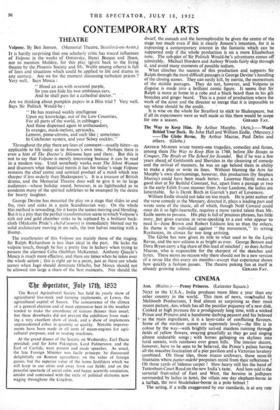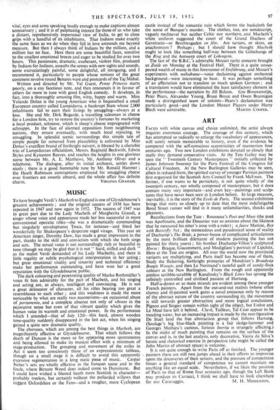CINEMA
Ann. (Rialto.) Penny Princess. (Leicester Square.) Nocr to the U.S.A., India produces more films a year than any other country in the world. This item of news, vovvhsafed by Mehboob Productions, I find almost as surprising as their most recent picture, Aan, which has all the peculiar piquancy of a new dish. Cooked at high pressure for a prodigiously long time, with a wicked Prince and Princess and a handsome dashing peasant and his beloved as the main ingredients, it is a layer-cake of conflicting flavours. Some of the outdoor scenes are supremely lovely—the film is in colour by the way—with brightly sari-ed maidens running through fields of yellow flowers, swaying gracefully as they go and singing almost endurable songs ; with horses galloping on skylines into lurid sunsets, with rainbows over green hills. The interior decors, however, have to be seen to be believed, the Prince's palace having all the macabre fascination of a pier pavilion and a Victorian lavatory combined. Oh those tiles, those stucco archways, those neon-lit fountains where papier-mâché porpoises recoil from their reflections ! Oh those yards of hideous carpet ! How heavy still lies the hand of Tottenham Court Road on the new India's taste. And how odd is the sartorial fruit-salad of East and West, the heroine in jodhpurs surrounded by ladies in lame, the villain one day elephant-borne in a turban, the next Studebaker-borne in a polo helmet !
The acting, if a trifle exaggerated by our standards, is at any rate vital, eyes and arms speaking loudly enough to make captions almost unnecessary ; and it is of palpitating interest for those of us who take a distant, reprehensively impersonal view of India, to get to close grips with a handful of its inhabitants. That Indians make exactly the same faces as we do when they fall in love astounds me beyond measure. But then I always think of Indians by the million, and a million has no face. Here there are some beautiful faces, sensitive to the smallest emotional breeze and eager to be studied for over two hours. This passionate, dramatic, exuberant, violent film, produced by Indians for Indians, assaults the senses with new sights and sounds, some excruciatingly painful, some delightful, all intriguing, and I recommend it, particularly to people whose notions of the great continent revolve round Benares ware and postcards of the Taj Mahal.
Written and directed by Mr. Val Guest, Penny Princess starts poorly, on a coy facetious note, and then renounces it in favour of others far more in tune with good English comedy. It develops, in fact, into a thoroughly amusing filin, witty, happy and warm. Miss Yolande Dolan is the young American who is bequeathed a small European country called Lampidorra, a bankrupt State whose 2,000 inhabitants fail to earn their livings by smuggling—always at a loss. She and Mr. Dirk Bogarde, a travelling salesman in cheese for a London firm, try to restore the country's fortunes by marketing a local product, schneese, which is sheep's cheese impregnated with schnapps. In the face of alarmed opposition from neighbouring nations, they return eventually, with much local rejoicing, to smuggling. In splendid scenic surroundings this simple tale of simple people far removed from plausibility is enlivened by Miss Dolan 's excelrent brand of forthright naiveté, is blessed by a cherubic trio of Lampidorran officialdom, Messrs. Reginald Beckwith, Edwin Styles and Kynaston Reeves, and reaches the heights in one glorious scene between Mr. A. E. Matthews, Mr. Anthony Oliver and a telephone. The dialogue, after its initial archness, settles down nicely ; there is a good hummable tune by Mr. Ronald Hanmer ; the Heath Robinson contraptions employed for smuggling cheese over frontiers are sweetly absurd, and the whole affair has definite



































 Previous page
Previous page